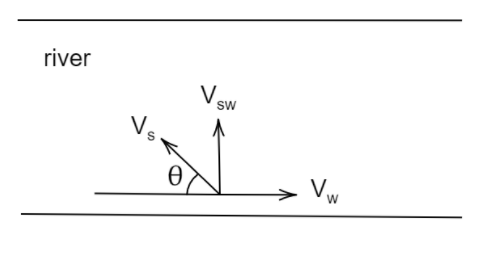Question
Question: A man crosses a \[{\text{320 m}}\] wide river perpendicular to the current in \[{\text{4}}\] minutes...
A man crosses a 320 m wide river perpendicular to the current in 4 minutes. If in still water he can swim with a speed 35 times that of the current, then the speed of the current, in m/min is
A. 30
B. 40
C. 50
D. 60
Solution
In this question, we are given the resultant velocity and velocity of the swimmer is 35 times speed of the current. This question can be solved using vectors. As the resultant velocity is perpendicular, the velocity of the swimmer must be in the negative direction. Resolve the velocity of the swimmer into its component. Components along the river must be equal to the speed of current and components perpendicular to the river must be equal to resultant velocity. Solve the equations and find out the speed of the current.
Complete step by step answer:
We are given,
Width of river =320 m
Time taken by the swimmer to cross the river = 4 minutes
Resultant velocity of the swimmer is Vsw=4320 m/min = 80 m/min
Let the velocity of the swimmer in still water be Vs
Let the speed of current be Vw
Given, Vs=35Vw
To solve this question, draw the vector diagram
Since the resultant velocity is perpendicular to the direction of speed of current swimmer must swim in the negative direction.
Let the swimmer make an angle θ with the horizontal

Resolve the velocity of swimmer into its components
Since the resultant velocity is in the perpendicular direction, the horizontal component of velocity of swimmer Vscosθ must cancel out Vw
Thus, Vscosθ=Vw
But we are given, Vs=35Vw
⇒35Vwcosθ=Vw
Cancelling Vw from both the sides we get,
⇒cosθ=53
Therefore, sinθ=54
The resultant velocity of the swimmer must be equal to the vertical component of swimmer velocity
Vsw=Vssinθ
Substituting the values we get,
54Vs=80
⇒Vs=100 m/min
Thus, velocity of swimmer in still water is 100 m/min
We can find out the speed of current using Vs=35Vw
Substituting the values we get,
Vw=60 m/min
Thus, speed of the current is 60 m/min
Thus, option D. is the correct option.
Note: In this type of question, always draw the vector diagram to solve the question easily and try to resolve them into components and equate. Find whether the swimmer is going upstream or downstream and the angle it is making with the horizontal using the resultant velocity.
